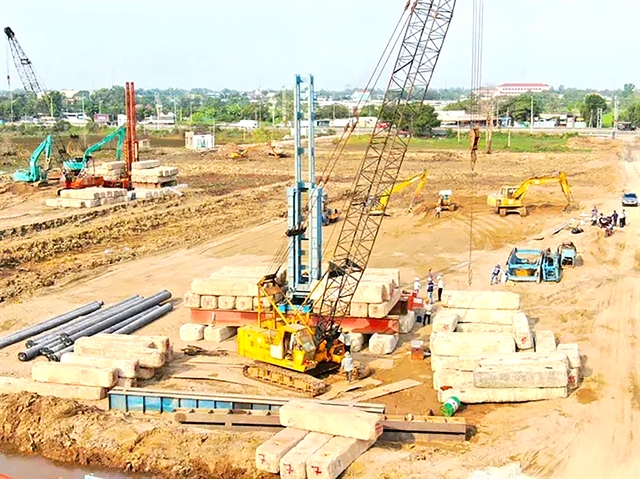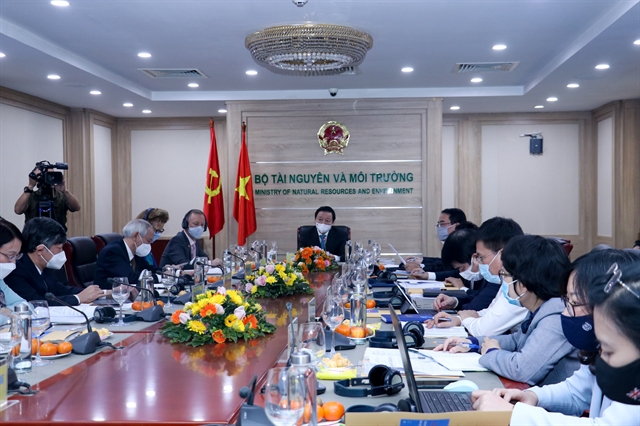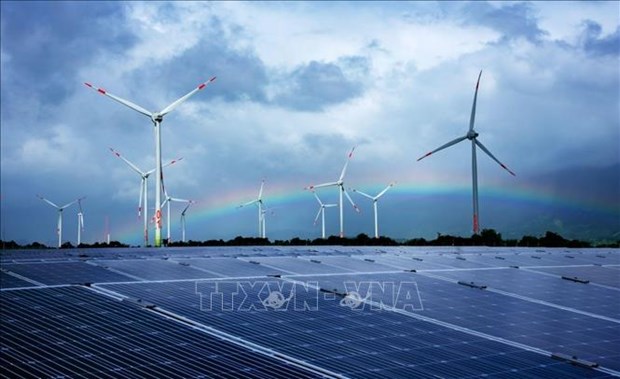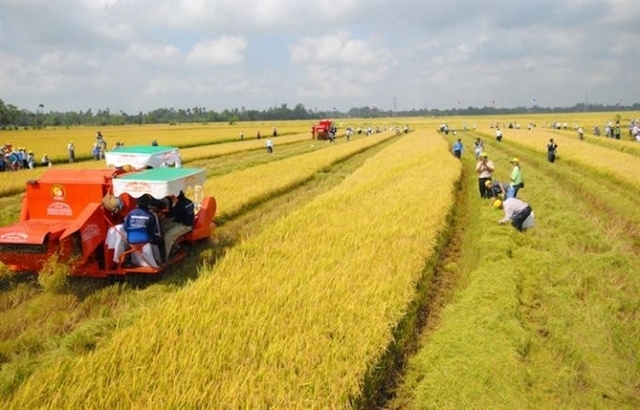 Society
Society


|
| The workshop sharing key outcomes of COP26 co-held by the British Embassy and Ministry of Natural Resources and Environment in Hà Nội on Tuesday. VNS Photo Tố Như |
HÀ NỘI – Việt Nam’s strong commitments at the UN Climate Change Conference (COP26) opened up many opportunities for co-operation in low-emission growth and promoting circular economy development, said Minister of Natural Resources and Environment Trần Hồng Hà.
Việt Nam would come up with mechanisms and policies to create a favourable environment and take advantage of opportunities for mobilising resources for climate-resilient infrastructure and renewable energy development as per the commitments made at COP26, Hà said at a workshop sharing key outcomes of COP26 co-held in Hà Nội by the British Embassy and Ministry of Natural Resources and Environment (MONRE).
At COP26, Prime Minister Phạm Minh Chính announced strong commitments to tackle climate change, emphasising with its own resources, along with the co-operation and support from the international community, especially developed countries, both in terms of finance and technology transfer, including implementing mechanisms under the Paris Agreement, Việt Nam will develop and implement strong emissions reduction measures to achieve net-zero emissions by 2050.

|
| Wind and solar energy in the southern province of Ninh Thuận. Việt Nam plans to further develop renewable energy in the future. VNA/VNS Photo |
Việt Nam has also agreed to support a number of important statements and initiatives on protecting forests, shifting to clean energy, supporting adaptation for local communities, and methane reduction.
All of these statements further strengthen Việt Nam’s commitment to tackling climate change.
“Việt Nam was on the right track of the global development trend along with developed countries with high economic and technological potential,” Hà said.
“The commitment of net-zero emissions and joining the methane commitment had sent a strong signal to the international community, unleashing global finance for low-emission development, which was also an opportunity for Việt Nam’s development," he said.
Speaking at the workshop, vice director of MONRE’s Climate Change Department, Phạm Văn Tấn, also affirmed that Việt Nam’s strong commitments and responsible contributions at the conference were highly appreciated by the international community, opening up many opportunities for co-operation in low-emission growth, promoting circular economic development and climate change adaption.
The revised Law on Environment in 2020 and draft decree on mitigating greenhouse gas emissions and protecting the ozone layer, which had been developed in the direction of approaching the latest regulations in climate change negotiations and fully consistent with the adopted regulations at COP26, will be an important legal basis for mobilising the whole society to respond to climate change, Tấn said.
Low-emission development would be the key trend for Việt Nam to continue to comprehensively change from fossil energy and resources development model to a low-emissions model, he said.
However, the biggest challenge for Việt Nam was mobilising and maintaining the participation of the entire political system with the steadfast determination to implement the long and difficult transformation roadmap.
Domestic resources were very modest while foreign resources were abundant but they were difficult to enter the country due to obstacles in administrative mechanisms and procedures.
In addition, domestic human resources were not currently sufficient to apply advanced technologies and production processes, the vice director said.
To realise the COP26 commitments, Việt Nam will issue a decree on mitigating greenhouse gas emissions and protecting the ozone layer, develop a project of tasks and breakthrough solutions to implement the results of COP26, set up a steering committee for proposing mechanisms, policies, laws to promote administrative procedure reform, create a favourable environment and take advantage of opportunities for mobilising domestic and foreign resources for climate-resilient infrastructure and renewable energy development.
Additionally, Việt Nam will complete the National Strategy on Climate Change including the goal of net-zero emissions by 2050, develop an action plan to reduce methane emissions by 2030 and implement the National Strategy on Green Growth and carbon pricing tools as well as actively and proactively enhance international co-operation to take advantage of financial and technological resources and strengthen capacity to implement the Paris Agreement and commitments made by the Prime Minister at COP26.
Research and development of new energy such as hydrogen, wave energy and geothermal energy, and nuclear power will be enhanced. – VNS




